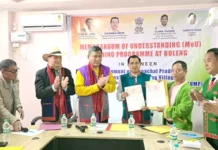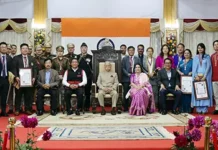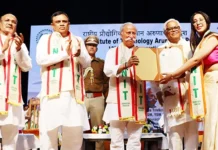ITANAGAR, 9 Jun: A collective of scientists, researchers, and practitioners have issued a statement of solidarity with the indigenous Adi communities of Beging and the wider Siang valley in Arunachal Pradesh, who are opposing the proposed Siang Upper Multipurpose Project (SUMP).
A total of 114 signatories have endorsed the statement, which is rooted in a deep and nuanced understanding of the ecological, cultural, and social implications of the project.
The statement underscored that the proposed dam is situated in one of the most biologically and culturally rich regions of the Eastern Himalayas, and called for a serious re-evaluation of how such infrastructure projects are planned and executed in sensitive areas.
The Siang river is central to their identity, livelihoods, and cultural practices, the statement noted.
The proposed SUMP would submerge terraced rice fields, interrupt gravity-fed irrigation systems, and dismantle complex agro ecological practices rooted in generations of traditional ecological knowledge.
In their joint statement, the signatories highlighted that “compensation mechanisms rarely account for non-monetary values such as land-based identity, ecological knowledge, and customary rights.”
They argued that such omissions can cause irreparable harm to both people and ecosystems.
“The Siang valley is globally significant for its biodiversity. In just the past 15 years, over 48 species new to science have been discovered in the region. It is also home to rediscovered species like the Siang swamp eel (Ophichthys hodgarti) and the velvet worm (Typhloperipatus williamsoni). Iconic fish species such as the golden mahseer (Tor putitora), Glyptothorax siangensis, and Opsarius siangi – many of which are endemic – depend on the river’s free flow. These species are not only ecologically important but are also vital to local food systems and economies.
The signatories called on both the union and the state government to immediately suspend all activities related to the SUMP; recognize and protect community forest and resource rights; and ensure that local communities are given full agency in decision-making processes, in line with the principle of free, prior, and informed consent.
The collective affirmed that the Siang valley is an area of treasured and irreplaceable cultural and ecological importance. They urged that the region’s rivers, forests, and indigenous communities be placed at the heart of any vision for a just, equitable, and ecologically sound future.



